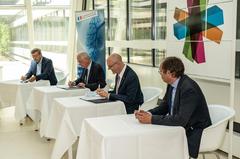URL: https://www.desy.de/news/news_search/index_eng.html
Breadcrumb Navigation
DESY News: Together against infectious diseases
News
News from the DESY research centre
Together against infectious diseases
After five years of successful cooperation as associated partner, the Research Center Borstel, Leibniz Lung Center (FZB) will become a full member of the Centre for Structural Systems Biology (CSSB) in Hamburg starting on 01 July 2021. The contract for this future cooperation was signed yesterday at a small ceremony.

Prof. Thomas Dobner, Prof. Helmut Dosch, Prof. Schaible and Prof. Meier (from left to right) at the signing of the contract. Photo: Kerstin Pukall.
"After five years as associate partner, we are excited to welcome the Research Center Borstel as full CSSB partner. The Research Center Borstel's (FZB) focus on understanding the causes and mechanisms of lung infections both complements and expands CSSB's research portfolio. This partnership will inspire innovative research projects that will forward our understanding of infectious diseases," said Prof. Dr. Chris Meier, CSSB's Scientific Director, in his welcoming remarks to the guests at the signing ceremony. In addition to Prof. Meier and a small delegation of researchers from the FZB, Dr. Oliver Grundei, State Secretary for Science and Culture (SH), Dr Eva Gümbel, State Councillor for Science, Research, Equality and Districts of the Free and Hanseatic City of Hamburg, Ministerialdirigent Rüdiger Eichel, Lower Saxony Ministry of Science and Culture, Dr Jan Grapentin, Federal Ministry of Education and Research, Prof. Dr. Thomas Dobner, Scientific Director of the Leibniz Institute for Experimental Virology (HPI) and chair of the CSSB council, and Prof. Dr. Helmut Dosch, Chairman of the DESY Board of Directors and deputy chair of the CSSB council, were also gathered in the CSSB foyer (in compliance with the applicable hygiene requirements) to celebrate the joining of Research Center Borstel.
"By joining CSSB, the Research Center Borstel strengthens a northern German research network dedicated to a global problem - research into infectious diseases. The last 1.5 years have made it painfully clear to all of us how important research in this field is. CSSB, together with the neighbouring DESY facilities and the European XFEL, offers a globally outstanding infrastructure that promises new breakthroughs in infection research based on the available instruments alone," said State Secretary Dr Oliver Grundei.
The Research Center Borstel, Leibniz Lung Center has already been an associate CSSB partner since 2016, contributing its scientific expertise in the field of infection biology with a focus on tuberculosis. "As full partner, we can expand our long-standing research activities on bacterial lung infections especially tuberculosis with the techniques used at CSSB. For us, it is an exciting perspective to be able to use, for example, the innovative and high-resolution imaging techniques at CSSB to study interactions between bacteria, such as the tuberculosis agent, and lung cells but also other microbes of the naturally occurring microflora" said Prof. Dr. Ulrich Schaible, Director FZB. In the future, this collaboration at CSSB will be expanded on three levels.
In a joint financial effort of all partners, a safety level 3 (BSL-3) laboratory will be established, which will be available to all groups from 2022/2023 and will include an electron cryo-microscope in addition to the atomic force microscope. The BSL-3 laboratory will be operated by the FZB which will be able to contribute its many years of experience in dealing with airborne pathogens such as the tuberculosis pathogen.
Under the direction of the Borstel "Biophysics" research group, a new atomic-force microscope will be installed in CSSB laboratory space. This microscope will allow visualisation of surfaces at the molecular level, leading to a better understanding of the structure and interaction of pathogens. "The microscope is being set up in the BSL-3 laboratory so that in the future we will also be able to carry out important structural biology research on highly pathogenic pathogens," said Prof. Thomas Gutsmann, head of the Biophysics Research Group and deputy director of the "Infections" program area at FZB. "This research has never been possible before. CSSB will have the first BSL-3 laboratory in the world with an atomic force microscope that will not only be used for tuberculosis research, but also for other bacterial and viral pathogens."
In addition, a research group will be included in the CSSB: The group "Interactome of Dysbiosis" from the “Lung Health Specialty” will focus on structural research of bacteria and bacterial associations.
The scientists will investigate the interaction of bacteria with surface structures of the lung in chronic lung diseases. For the establishment of this research group, a tenure-track W2 professorship will be established at the Universität Hamburg. This professorship is currently being advertised and is expected to be filled next year. "We are very pleased that the approved funding of the "Lung Health" programme has given us the opportunity to fill the research group at CSSB. This group will use the innovative structural biology and imaging infrastructures at CSSB to study interactions between pathogens, the microflora and host cells in order to identify new drug targets and will closely link CSSB and FZB," said Schaible.
"I am very pleased that the full partnership of the Research Center Borstel will strengthen the cooperation with CSSB. This means that research at CSSB in the field of lung infections can be further advanced - an important step towards expanding infection research at our science location. I am very excited about the future projects and wish the researchers at CSSB and FZB continued success in their important work!" said State Councillor Dr Eva Gümbel.



